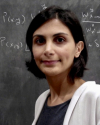- Spring 2021
Syllabus Description:
Welcome to PHYS 428 / PHYS 578. My name is Armita Nourmohammad (pronouns she/her), and I will be your instructor.
In this class everyone is welcome, regardless of other identities you hold in addition to that of physics student. I expect everyone in this class to treat each other with respect.
Overview
The advent of high-throughput techniques is transforming biology into a fully quantitative and theory-rich science. For example, recent advancements in genetic sequencing has opened new avenues to study cellular processes at short time scales at the level of individual organisms, and on longer evolutionary time scales at the level of species and populations. Statistical physics is the right language to describe complex biological systems with many degrees of freedom, and is being used to uncover principles of molecular motions, protein folding, evolution of populations, or to interpret biological data. The main focus of this course is to explore recent work in biology in conjunction with topics in statistical physics and information theory. By highlighting examples from a broad range of biological phenomena, the course will cover topics on information theory and optimality, probabilistic inference, non-equilibrium processes in biology, and evolutionary dynamics. Inspired by these topics, students will work in groups on small projects and will present their work at the end of the quarter.
Getting started
- Attend or watch the introductory video recording for the First Class
- Slack will be the primary space where you can communicate with your TA and the rest of the class. To get started with this space, please:
- Use your UW email to join our Slack workspace.
- Get Slack running on your device. Here are useful tips and features for using Slack. I highly recommend downloading the mobile or desktop app, and turning notifications on so that you don't miss messages.
Lecture Materials and Assignments
- Go to the Modules tab (on the left) and review each week's notes and recorded videos on the week's material.
- Each week's assignments and the suggested papers can be found in the week's Module
Lectures and Office Hours
- Lectures take place synchronously over zoom on Tue and Thu 1:00 - 2:20 pm. You can directly access from the canvas menu (on the left).
- The direct link to the lecture zoom meetings: https://washington.zoom.us/j/98974262603
- Recorded lectures can be access under the "cloud recording" in the canvas zoom page
- Office hours:
Tuesdays 2:45 - 3:30 pm, zoom link: https://washington.zoom.us/j/94439119436
Thursdays 4:30 - 5:30 pm, zoom link: https://washington.zoom.us/j/94641309764
Contact information
For questions either send an email (armita@uw.edu) or a canvas message to me.
For questions to Michael Pun (TA) send an email (mpun@uw.eud).
Recommended reading:
- Biophysics: Searching for Principles (William Bialek); Princeton University Press, 2012 (early draft of the book)
- Information theory, inference, and learning algorithms (David McKay); Cambridge University
Press, 2003 (downloadable version). Also check out the YouTube videos of D. McKay. - Paper repository with links to relevant papers can be found here.
Credits
To get credits in this class it is expected that you:
- hand in the homework on information theory
- participate in class discussions of papers and lead at least one of these discussions
- propose a class project, write an essay on, and present your project at the assigned dates
Access and accommodation
Your experience in this class is important to me, so if you have a temporary health condition or permanent disability that requires accommodations (conditions include but are not limited to: mental health, attention-related, learning, vision, hearing, physical), please contact DRS to arrange accommodations.
Safe campus
I am committed to ensuring a safe environment on campus. I encourage you to check out the resources available here.
Religious Accommodations
Washington state law requires that UW develop a policy for accommodation of student absences or significant hardship due to reasons of faith or conscience, or for organized religious activities. The UW’s policy, including more information about how to request an accommodation, is available at Religious Accommodations Policy (https://registrar.washington.edu/staffandfaculty/religious-accommodations-policy/). Accommodations must be requested within the first two weeks of this course using the Religious Accommodations Request form (https://registrar.washington.edu/students/religious-accommodations-request/).
Academic integrity and student conduct
The University takes academic integrity and student conduct very seriously. Behaving with integrity and respect is part of our responsibility to our shared learning community. Acts of academic misconduct may include, but are not limited to, cheating by working with others or sharing answers on exams.
Please note that screenshots or recordings of instructors, other students, and course materials during active video (Zoom) participation sessions are strictly forbidden. Streaming or posting inappropriate materials on any course platform is also not allowed.
All the course materials including lecture notes, lecture videos are intellectual properties of the instructor and the University of Washington. Distributing them in any form without permission is forbidden.
The University of Washington Student Conduct Code (WAC 478-121) defines prohibited academic and behavioral conduct and describes how the University holds students accountable as they pursue their academic goals. Allegations of misconduct by students may be referred to the appropriate campus office for investigation and resolution. More information can be found online at https://www.washington.edu/studentconduct/.
If you’re uncertain about if something is academic or behavioral misconduct, ask me. I am willing to discuss questions you might have.
